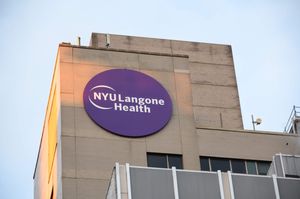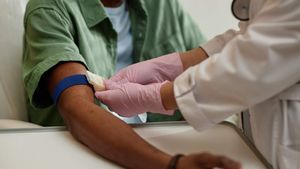June 25 2010 12:00 AM EST
Treatment GuideJust DiagnosedSex & DatingAfrican AmericanStigmaAsk the HIV DocPrEP En EspañolNewsVoicesPrint IssueVideoOut 100
CONTACTCAREER OPPORTUNITIESADVERTISE WITH USPRIVACY POLICYPRIVACY PREFERENCESTERMS OF USELEGAL NOTICE
© 2026 Pride Publishing Inc.
All Rights reserved
All Rights reserved
By continuing to use our site, you agree to our Privacy Policy and Terms of Use.
HIV-positive mothers who receive antiretroviral therapy are likely to be able to breast-feed their newborns without passing on the virus, suggest the findings of two recent reports.
In a study from Botswana, 560 HIV-positive women who were randomized to three different regimens of highly active antiretroviral therapy administered from pregnancy through six months postpartum had a combined rate of mother-to-child transmission of 1.1%. Women were randomized to a nucleoside reverse transcriptase inhibitor group, a protease inhibitor group or an observational group that received nevirapine plus zidovudine-lamivudine.
All infants received single dose nevirapine and four weeks of zidovudine.
The authors working on this study described the transmission rates among the groups as similar but noted that the study was not designed to compare rates among the groups.
In a separate study of 2,369 HIV-positive breast-feeding women in Malawi, researchers compared the efficacy of a maternal antiretroviral program and infant nevirapine in reducing HIV transmission. A control group received no extended postnatal antiretroviral regime.
Among the mother-infant pairs, 5% of infants were HIV-positive two weeks after birth. The risk of HIV transmission between week 2 and week 28 was 5.7% in the control group, 2.9% in the maternal regimen group, and 1.7% in the infant regimen group. The authors concluded that either a maternal antiretroviral regimen or infant nevirapine for 28 weeks was effective for reducing HIV transmission during breastfeeding.
"Health care providers and mothers can ultimately choose the option that best suits their cultural, economic, and individual needs, since there is now evidence for two effective options to prevent the transmission of HIV-1 to infants from their mothers during breast-feeding in resource-limited countries," the authors concluded.
The full reports, "Antiretroviral Regimens in Pregnancy and Breast-feeding in Botswana" and "Maternal or Infant Antiretroviral Drugs to Reduce HIV-1 Transmission," were published in The New England Journal of Medicine.
From our Sponsors
Most Popular
“So much life to live”: Eric Nieves on thriving with HIV
September 03 2025 11:37 AM
It’s National PrEP Day! Learn the latest about HIV prevention
October 10 2025 9:00 AM
Amazing People of 2025: Javier Muñoz
October 17 2025 7:35 PM
“I am the steward of my ship”: John Gibson rewrites his HIV narrative
September 16 2025 2:56 PM
Plus: Featured Video
Latest Stories
HIV-positive men stage 'Kiss-In' protest at U.S.-Mexico border
December 01 2025 12:56 PM
What the AIDS crisis stole from Black gay men
December 01 2025 6:00 AM
The Talk: Owning your voice
August 25 2025 8:16 PM
The lab coat just got queer
August 21 2025 10:00 AM
Messenger RNA could be the key to an HIV vaccine — but government cuts pose a threat
August 20 2025 8:02 AM
The Talk: Beyond the exam room
August 13 2025 3:15 PM
The Talk: Navigating your treatment
August 01 2025 6:02 PM
The Talk: Starting the conversation
July 25 2025 4:47 PM
Thanks to U=U, HIV-positive people can live long, happy, healthy lives
July 25 2025 2:37 PM
How the Black AIDS Institute continues to fill in the gaps
July 25 2025 1:06 PM
“I felt like a butterfly”: Niko Flowers on reclaiming life with HIV
July 23 2025 12:22 PM
Dancer. Healer. Survivor. DéShaun Armbrister is all of the above
July 02 2025 8:23 PM
BREAKING: Supreme Court rules to save free access to preventive care, including PrEP
June 27 2025 10:32 AM
1985: the year the AIDS crisis finally broke through the silence
June 26 2025 11:24 AM
VIDEO: A man living with HIV discusses his journey to fatherhood
June 10 2025 4:58 PM
Trump admin guts $258 million in funding for HIV vaccine research
June 03 2025 3:47 PM

































































